From Problem to Innovation: The Story of PWN Lending Protocol
Aug 15, 2023
Jan Hetfleiš
Welcome to today's interview with Josef Je, co-founder of PWN - a peer-to-peer lending protocol designed for long-term, mortgage-like loans of digital assets backed by other digital assets. In this interview we discuss how PWN came to be, what makes it unique from other lending protocols, how it overcomes common industry hurdles, what achievements he is proud of and what we can expect in the future.
Can you tell us a bit about yourself, your role at PWN and how you got involved in the blockchain industry?
Initially got involved as an Ethereum Meetup Organizer and freelance Solidity dev in 2016, In 2018 I joined the Ethereum Foundation in a fuzzy role where I was working in multiple teams among R&D teams, Devcon and operations. I finally decided to fully switch to a CEO role at PWN in early 2022.
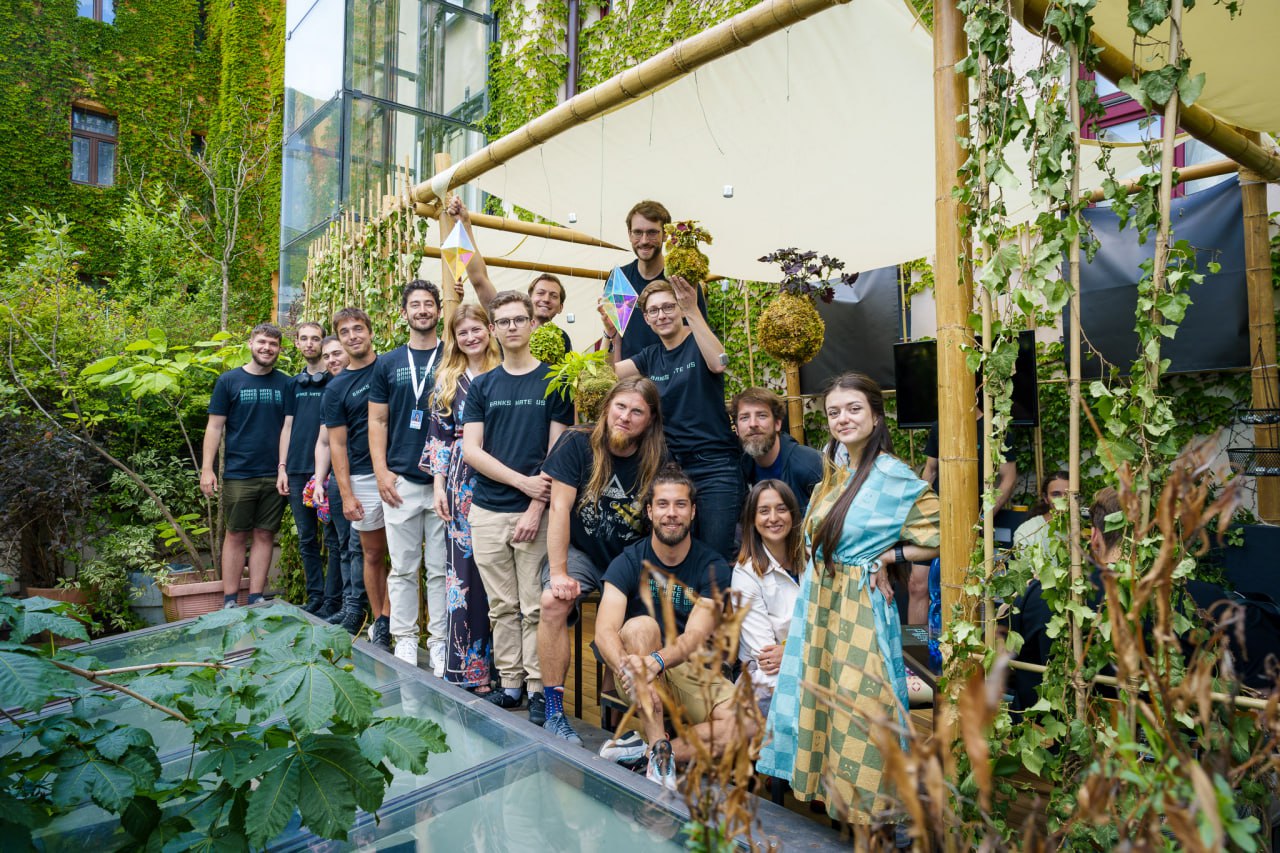
PWN team at ETHPrague 2023
What is the story behind the creation of PWN? What was the inspiration for its creation?
There are multiple, so it’s more of a story of how it all came together. First of all, the entire Ethereum community has been always inspiring as such with the worldview that anything can be solved if we think hard enough and try. Then projects like MakerDAO attempted creating something a bit crazy: a decentralized “central” bank where anyone could participate in building up a “gold-reserve” and minting or burning the currency. Until now I remember people saying out loud that it was nonsense and nobody is going to use it, which is kind of the same as what I heard about Ethereum while I was running the early Ethereum meetups. Fast forward 10 years Ethereum is the most used blockchain and MakerDAO has created a base ground for an entirely new industry of DeFi.
Secondly, I got triggered to build PWN as my mortgage application got rejected multiple times first not acknowledging my salary being paid in ETH dismissing my provable income as “that’s not real money” and a few years later with a discriminatory check box asking about my “exposure to cryptocurrencies” - which I wholeheartedly admitted.
With PWN DAO we are building with a similar mindset of the early dapps and protocols as today we might be building something that only makes sense to a handful of crypto-natives (or geeks if you wish) but has the potential to expand to something several orders of magnitude bigger as a baseline for non-custodial crypto backed mortgages.
What do you think makes PWN different from other lending platforms in the industry?
PWN is kind of taking a step back to the roots - focusing on building an efficient universal permissionless p2p lending protocol. Essentially PWN is much simpler to understand. I'd even say PWN is the simplest DeFi protocol to grasp out there as it doesn’t require any black-box magic like AMMs, or bonding curves and it doesn’t introduce a 3rd party dependency in the form of a price oracle.
Today, you can see PWN as a pawnshop for any token or NFT. You can either get a loan using your portfolio assets as collateral or you can fund other people’s loans with your desired terms enabling you to make a return on temporarily providing capital to others.
We went even further down the use case, so PWN Safe (our smart contract wallet) even enables you to keep the collateral in your custody - which opens up doors to separating the value and utility of crypto assets - just as you can do that with real-world assets through ownership rights. More about PWN Safe can be found on our blog.
Ultimately the mission of PWN is to enable crypto-natives to mortgage their crypto for 5 - 15 years, so they wouldn’t ever have to sell it and lose exposure to their digital wealth.
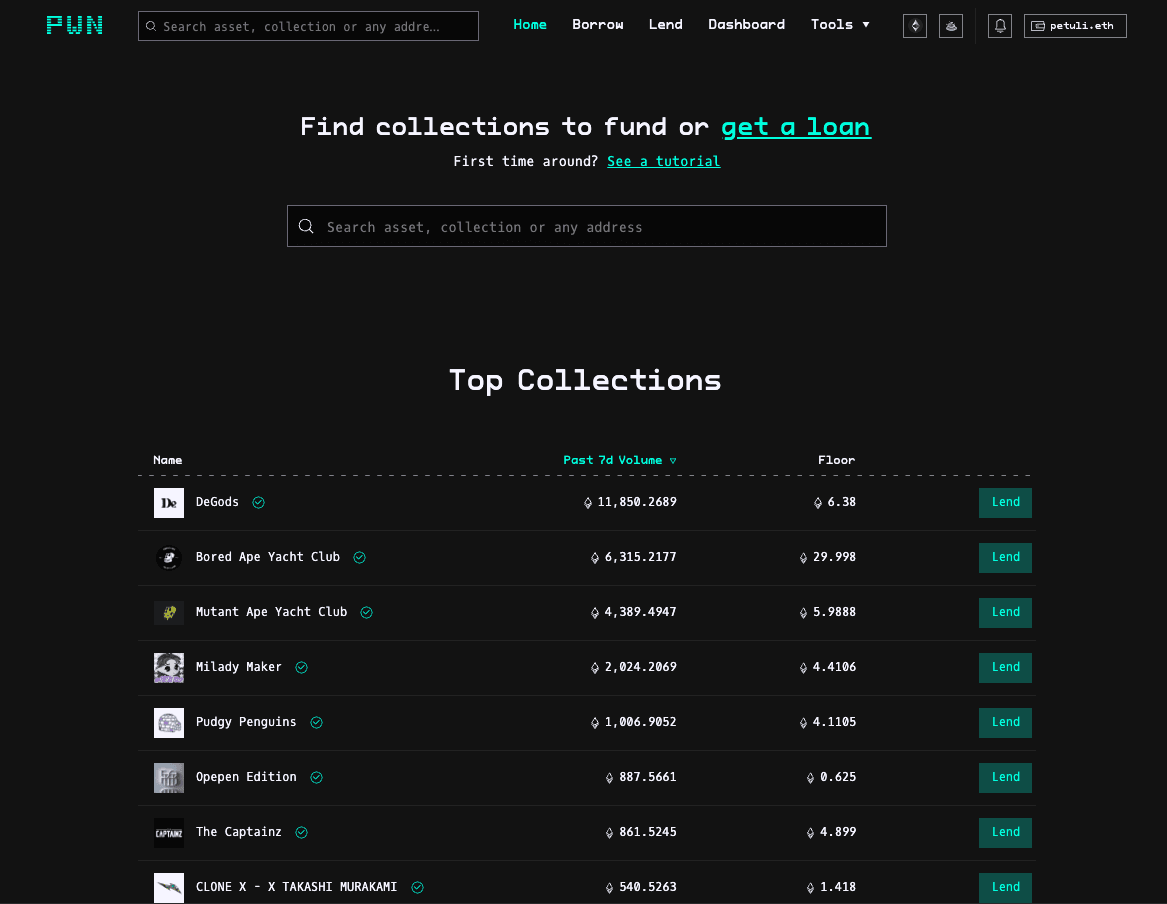
PWN Home Page
PWN offers a unique feature that allows users to use NFTs as collateral. NFTs tend to be quite volatile. Could you explain why you decided to include them in PWN?
First of all, crypto is volatile, not just NFTs. Even stablecoins depeg occasionally and today we live in a technology-enabled age when and even “traditional” commodities spike up and down (gas, oil, electricity). In my opinion, that’s just the initial stage of the market and with certain assets, we’ll get into a more and more stable region over time - however all of these are parameters that can be factored in when backing or taking a loan on PWN. So you yourself set a timeframe (duration), risk-tolerance (loan to value ratio; the lended/borrowed amount) and the reward/price (interest; how much money is paid back).
The lens we are looking through at PWN is more long-term - both the borrowers and lenders are making a time-framed bet on where the price of the collateral will be upon expiration of the particular loan - again that’s closer to pricing a mortgaged asset. That means that as a borrower you can’t get liquidated and as a lender, you have several options to outweigh the risks by only lending proportionally small amounts or exit your position by selling your loan (right to execute claims) to someone else with a different risk appetite.
Security is very important in the blockchain industry, especially when it comes to lending platforms. How does PWN ensure the security and protection of collateralized assets?
I think that security is the key to anything put on-chain, so we of course have two independent public audits from Entropy and Nethermind. The protocol is open-sourced and well-documented, so we’d encourage anyone interested to dive right into the repository or our docs.
Architectonically there is also no way to update the protocol and none of the old loans can be influenced retrospectively so each loan is basically locked independently.
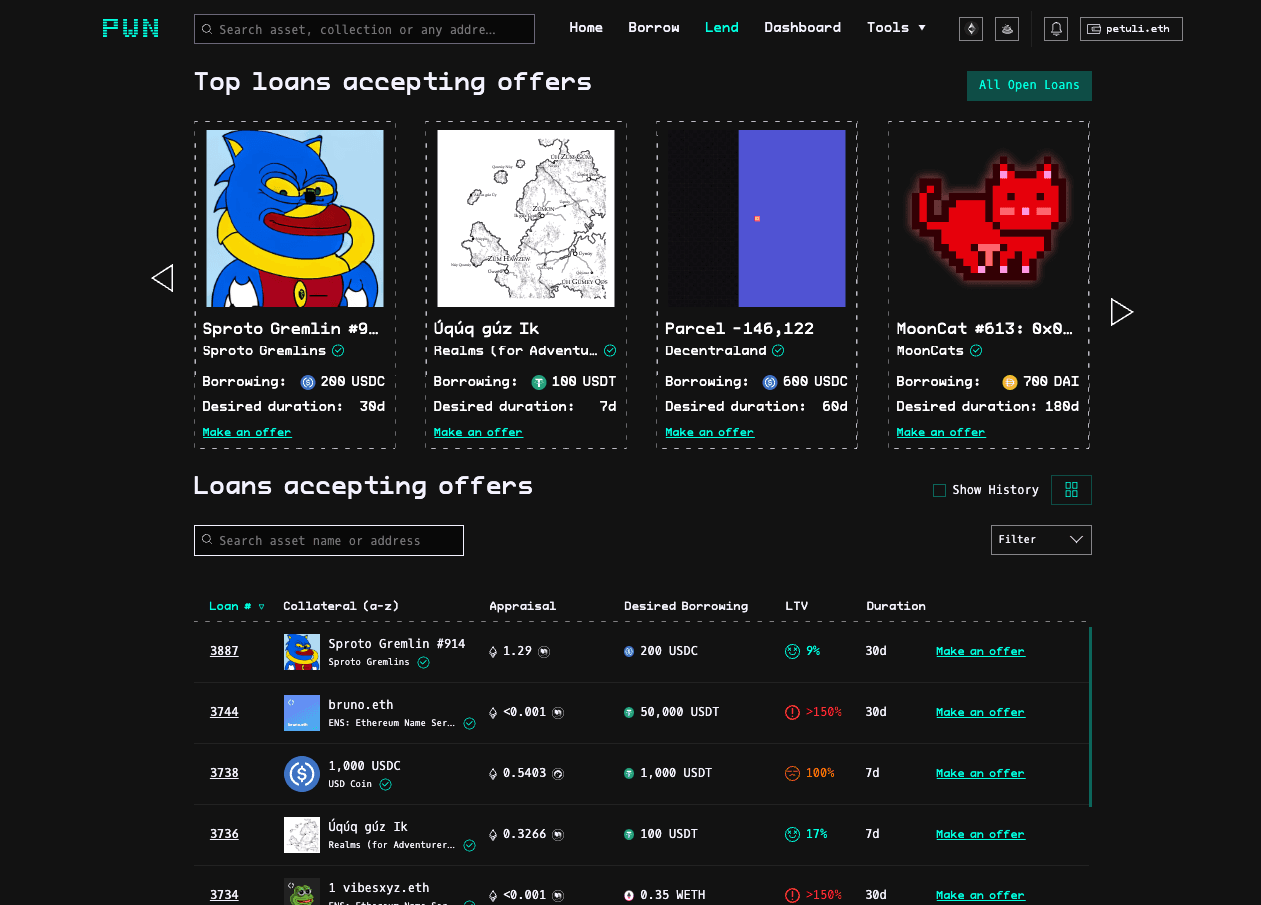
PWN Lend Page
Industry regulation is a hot topic right now. How do you approach compliance?
Initially, we’ve spent a lot of time, money and effort on conducting two legal researches about the compliance requirements not only of the crypto aspects but also the “lending/credit” business. I guess that one of the pitfalls of a lot of crypto startups is that they focus on the fact they are in crypto and somewhat forget that the world is much more complex and their business model may be touching other compliance requirements than just whatever relates to cryptocurrencies.
Building something which is true DeFi where we absolutely can’t access user funds helps. One more win for DeFi!
Can you reflect on a significant challenge or learning experience you encountered during your time at PWN, and how did you overcome it?
I wouldn’t say there was anything unexpected - finding a product market fit is a constant learning process and every step of that way is significant :)
Of course, there were challenges, but all of them seem minor in retrospect, so I just keep looking forward.
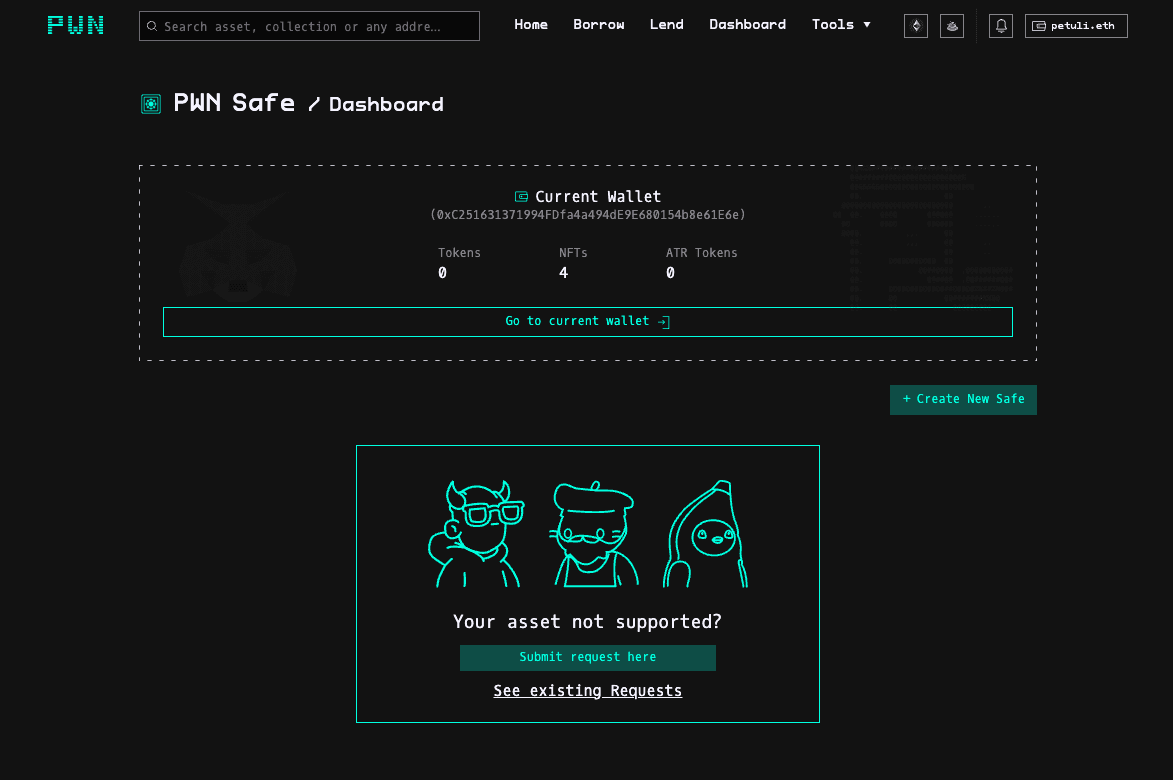
PWN Safe Dashboard
When you look back on your time at PWN, what do you consider to be the most notable achievement or milestone you and your team have reached?
I’d say that gathering an international fully distributed team of almost 20 amazing individuals within the first 4 months after incorporating the entity for PWN was a ninja move. Obviously, there was some fluctuation but the majority of the team didn’t change since the start. I’ve seen tremendous personal and professional growth of every single person on our team in the past 18 months and I’m incredibly happy and proud about it.
We also scored our seed round in one of the most difficult times for fundraising startups which provides me with a lot of reassurance about our direction and traction so far. Plus we have an amazing group of angels and advisors with deep ties to the industry and the historical moments of the industry which is always very humbling when it comes to getting feedback and input on our direction.
Looking ahead, what can we expect from PWN in terms of future innovation or expansion in the peer-to-peer lending space?
We are committed to improving the accessibility of the mortgage protocol. This means developing additional features, expanding the deployment to additional EVMs, improving collateral value assessment, and enabling a more adaptive loan flow. Our growing team will certainly not be bored in the coming months.
But you know what! I'd like to encourage the reader to try PWN and to tell us what’s missing - get on PWN and fund a loan or take some liquidity out yourself, we’ll be grateful for your feedback!
Check out the PWN FAQ, Guides, Discord, and X (Twitter) or go straight to the dapp.
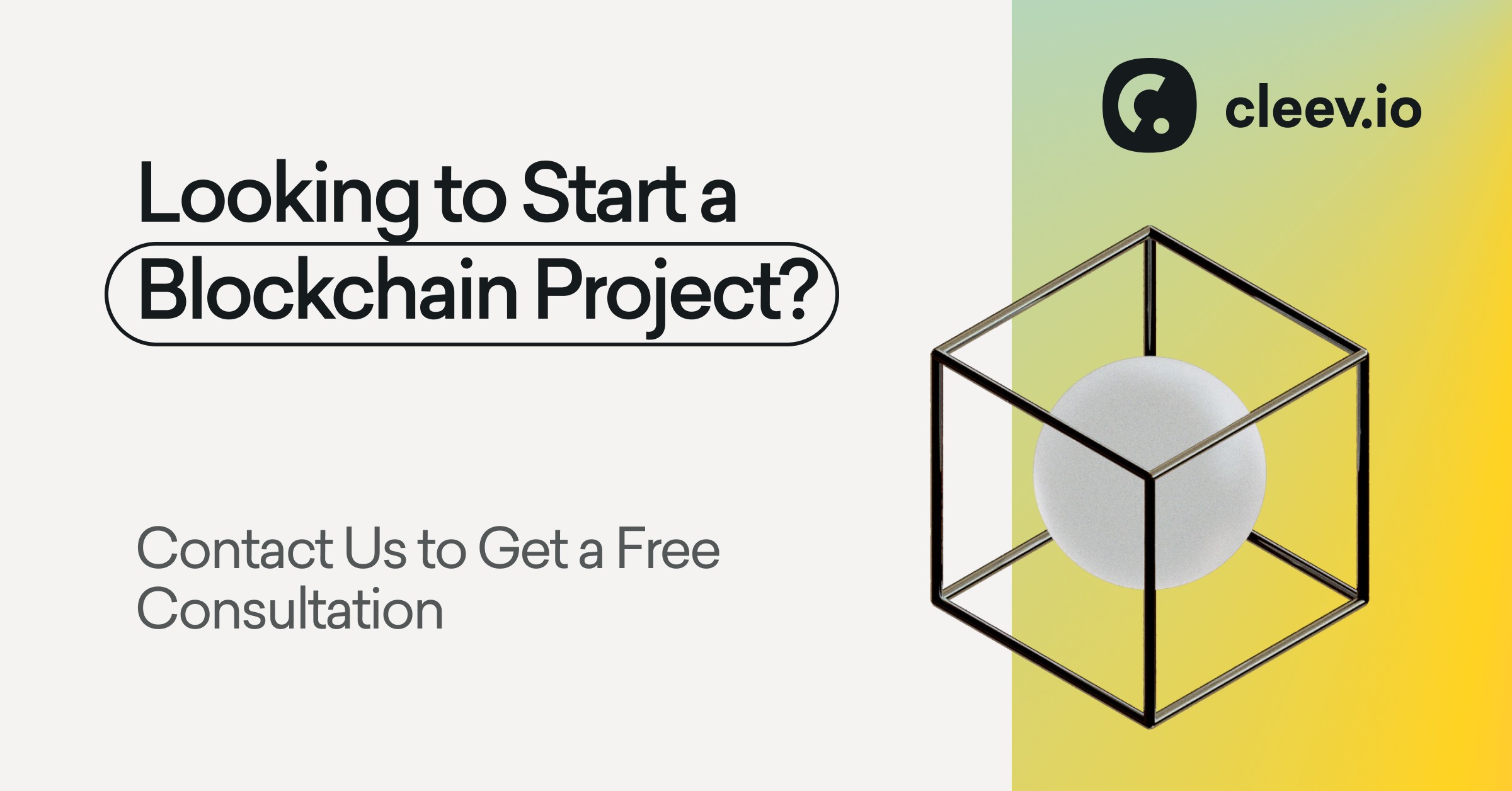
Building successful
products.together.
© 2008—2023 Cleevio
Lesnicka 1802/11
613 00 Brno
Mississippi House
Karolinska 706/3
186 00 Prague
Prague office
Brno office
CIN 18008844

